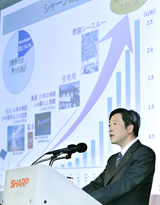Japanese electronics maker Sharp Corp is forecasting a bigger loss than first anticipated for the fiscal year ended last month, blaming the global recession, a clean-out of inventory and restructuring costs.
Sharp expects to post a net loss of ¥130 billion (US$1.3 billion), worse than the ¥100 billion loss it had projected in February.
“The global financial crisis is hurting all sectors at an unprecedented speed and scale,” Sharp president Mikio Katayama told reporters yesterday at the company’s Tokyo office.

PHOTO: AFP
Sharp has said it will cut 1,500 contract workers in Japan by the end of last month and its directors will forgo bonus pay in June and accept pay cuts of up to 50 percent. It had closed some panel production lines for mobile phones in response to the slowdown, which worsened last year.
Katayama said Sharp would focus on solar-panel and other businesses in health and the environment, as well as become leaner to achieve ¥200 billion in cost cuts, as it tries to return to profitability this year.
The electronics maker said it will give its projection for the fiscal year through next March when it announces earnings on April 27 for the fiscal year just ended.
Globally, Sharp will invest in markets with growth potential to produce goods where they are sold, partly to avert the negative effects of currency fluctuations, he said. Growth was expected in TV sales in China and other new markets in the long term.
The company was also looking at possible international partners to expand its business overseas because it boasts superior panel production technology, he said.
Sharp will start running a new LCD panel plant in Sakai City, central Japan, in October to prepare for such growth, ahead of schedule. The plant, which will make panels for 40-inch, 50-inch and 60-inch TVs, had initially been set to be up and running by next March.
Demand for flat-panel TVs was picking up in recent weeks, especially in China, and so production at Sharp’s two existing panel plants, where output had dived earlier this year to about half of previous levels, was back at full speed again, Katayama said.
Before announcing its projected loss in February, the Osaka-based company, which makes Aquos flat panel TVs, had been forecasting a ¥60 billion profit. It hadn’t had yearly red ink in nearly 60 years.
Sharp said adjustments to retailers’ inventories of flat panel TVs and liquid-crystal displays were behind the latest revision.
Sharp also lowered its fiscal sales forecast to ¥2.85 trillion from the initial ¥2.9 trillion.
But Katayama said the company was making progress in lowering inventories and in the US, a crucial market, what had been 3.3 months worth of inventory in September dropped to 0.7 months worth in February.

SECURITY: As China is ‘reshaping’ Hong Kong’s population, Taiwan must raise the eligibility threshold for applications from Hong Kongers, Chiu Chui-cheng said When Hong Kong and Macau citizens apply for residency in Taiwan, it would be under a new category that includes a “national security observation period,” Mainland Affairs Council (MAC) Minister Chiu Chui-cheng (邱垂正) said yesterday. President William Lai (賴清德) on March 13 announced 17 strategies to counter China’s aggression toward Taiwan, including incorporating national security considerations into the review process for residency applications from Hong Kong and Macau citizens. The situation in Hong Kong is constantly changing, Chiu said to media yesterday on the sidelines of the Taipei Technology Run hosted by the Taipei Neihu Technology Park Development Association. With

CARROT AND STICK: While unrelenting in its military threats, China attracted nearly 40,000 Taiwanese to over 400 business events last year Nearly 40,000 Taiwanese last year joined industry events in China, such as conferences and trade fairs, supported by the Chinese government, a study showed yesterday, as Beijing ramps up a charm offensive toward Taipei alongside military pressure. China has long taken a carrot-and-stick approach to Taiwan, threatening it with the prospect of military action while reaching out to those it believes are amenable to Beijing’s point of view. Taiwanese security officials are wary of what they see as Beijing’s influence campaigns to sway public opinion after Taipei and Beijing gradually resumed travel links halted by the COVID-19 pandemic, but the scale of

A US Marine Corps regiment equipped with Naval Strike Missiles (NSM) is set to participate in the upcoming Balikatan 25 exercise in the Luzon Strait, marking the system’s first-ever deployment in the Philippines. US and Philippine officials have separately confirmed that the Navy Marine Expeditionary Ship Interdiction System (NMESIS) — the mobile launch platform for the Naval Strike Missile — would take part in the joint exercise. The missiles are being deployed to “a strategic first island chain chokepoint” in the waters between Taiwan proper and the Philippines, US-based Naval News reported. “The Luzon Strait and Bashi Channel represent a critical access

Pope Francis is be laid to rest on Saturday after lying in state for three days in St Peter’s Basilica, where the faithful are expected to flock to pay their respects to history’s first Latin American pontiff. The cardinals met yesterday in the Vatican’s synod hall to chart the next steps before a conclave begins to choose Francis’ successor, as condolences poured in from around the world. According to current norms, the conclave must begin between May 5 and 10. The cardinals set the funeral for Saturday at 10am in St Peter’s Square, to be celebrated by the dean of the College